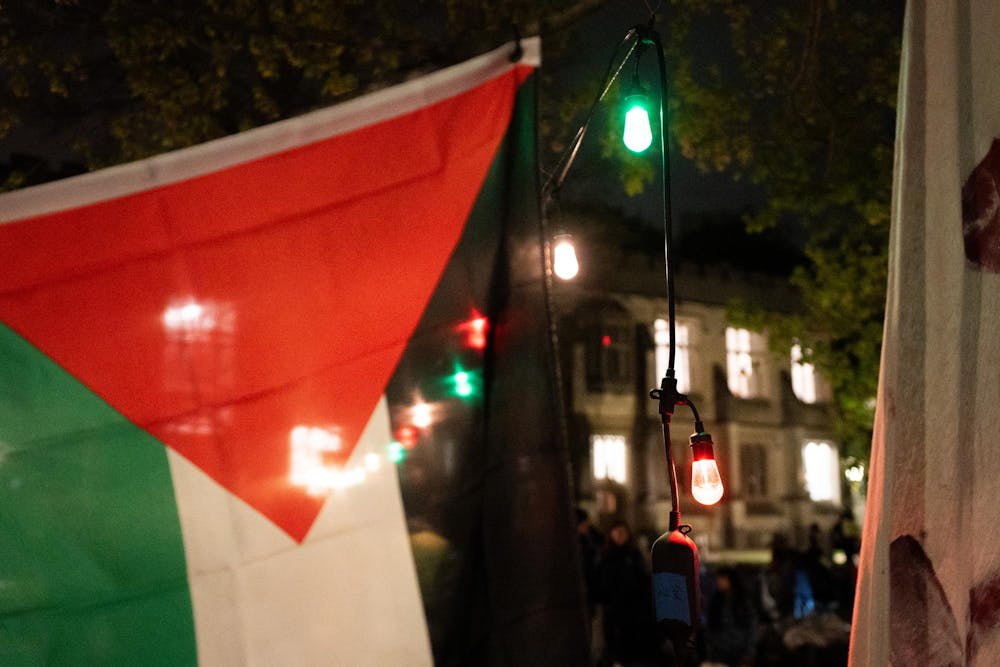The following is a guest submission and reflects the author’s views alone. For information on how to submit a piece to the Opinion section, click here.
I have been present at Princeton’s student protest for Gaza over the last several days, and I am beyond impressed by the depth of human empathy, logistical execution, and commitment to open-minded learning that has been shown at this protest. Programming has included lectures and teach-ins, visual artists and poets, and Palestinian food.
I have sat with friends and new acquaintances, discussing the broad calls for liberation that were emphasized in the Passover Seders we attended earlier this week. We have discussed the ways in which we can continue to better our institutions as well as the ways in which we can better our mobilization efforts. Bettering these efforts does not just mean making them more effective, but also more thoroughly accurate in their representation of our views and values. To do so, protesters must carefully consider the rallying cries we use.
I have had incredibly intricate and illuminating individual conversations, but it remains a fact that protests are inherently difficult spaces to inject nuance and complexity at a larger scale. Communication in and from large groups is difficult and currently limited by University administrations as they suspend and arrest peaceful protesters. As a result, organizers must use rallying cries. Some of which have used the term “intifada.”
I do not believe that the students who I have witnessed use the term “intifada” are intending to incite antisemitic violence. In fact, it should be emphasized that antisemitism at other student protests has been perpetrated almost exclusively by outside individuals who are neither associated nor affiliated with universities with these encampments. I’ve seen first hand how students work quickly to de-escalate and remove such individuals. However, due to the varying meanings of “intifada,” antisemitic individuals can interpret such phrases as permission to harass and harm Jewish individuals — especially when the call comes from voices at Princeton.
It is for all of these reasons that discussions emerged two days ago in the protest surrounding the use of the term “intifada.” Monday morning, the organizers made a verbal announcement in McCosh Courtyard stating that protesters at Princeton should no longer use the term. I am incredibly heartened by the organizers’ dedication to continually improving the ways in which we protest. I believe that other student protests should follow suit, and all protests, at Princeton and beyond, should continue to critically consider the language we use and its impacts. I think it is essential that we do not simply make this change and carry on. We must carefully consider the reasons why “intifada” was not constructive for our goals and its potential harms.
In the most literal sense, “intifada” means “shaking off” or “rising up,” and thus concisely encapsulates the aims of many Palestinian resistance movements. But words hold multiform meaning for different communities, especially when having been used in multilingual contexts over many years. In recent months, calls to “Globalize the Intifada” seem to have been adopted by extremist individuals and those who advocate violence against Jewish communities.
As we actively criticize Princeton, media focus on the happenings of elite college campuses amplifies our voices. As our words are carried further from McCosh courtyard or Cannon Green, the risk that our words are truncated, distorted, and used for hate grows.

We also risk alienating those who are wary of our rhetoric and its impact, even if they are aligned with the motivations and goals of our movement. I want to bring particular attention to the Princeton Jewish community, whose lived experiences should be centered in our discussions of antisemitism. Jewish students and faculty are a vital component of our broader campus community, and if our words could reasonably be expected to land on Jewish ears as threats, we must change our words.
We must take responsibility for the consequences of our language, even and especially when they are not our intention. If our rallying cries cause harm to those who do us no wrong, we are perpetrating the injustice we claim to protest. Our activism is hypocrisy if we do not couple our criticisms and condemnation with genuine and complex compassion for those impacted by the ongoing conflict.
Further, calls for intifada lessen the legitimacy of our activism to the lawmakers and administrators who we are begging to hear us. Until we hold those positions ourselves, we must understand — for the sake of our goals, for the sake of Palestinians — how to better communicate our beliefs. Our demands for change must not merely be loud enough that those in positions of power will hear, but also precise enough that they will listen.
I urge all of my fellow protestors at all universities to consider how we engage in chants and rallying cries, not just those that use the term intifada. When we hold power to account, we must hold ourselves to the highest standard. We must think critically about both the intended consequences of our words and actions and those that we have yet to consider. We must take responsibility for both. It is vital for us to continue reflecting on why “intifada” is not a good or productive rallying cry for our goals. We are not immune to the unintended consequences of our activism – neither are those who are watching and listening from outside of our campuses. We must protest better.

Sydney Eck is a senior in the Economics Department. She served as Head Features Editor under the 146th Board. She can be reached at seeck[at]princeton.edu.








